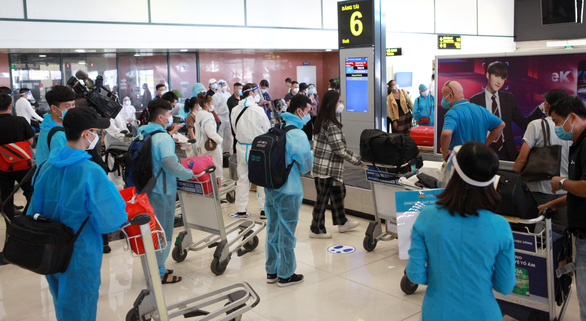Hanoi’s Noi Bai International Airport has established a monitoring center with 2,000 surveillance cameras to document human contact at the airdrome, which will help with possible attempts of COVID-19 contact tracing in the future.
To Tu Ha, director of Noi Bai International Airport, confirmed the new surveillance system during his report to Le Anh Tuan, Deputy Minister of Transport, and Nguyen Manh Quyen, deputy chairman of Hanoi, during a quality examination of Noi Bai’s passenger servicing and epidemic prevention protocols on Tuesday.
All entrances of Noi Bai are equipped with body temperature scanners and patrolled by security officers, who will single out passers-by with a body temperature over 37.5 Celsius degrees, according to Ha.
“Those who cross the gates with their masks off or pulled down under their noses will immediately receive a warning from the automatic alarm system,” Ha said about the airport’s latest technology for epidemic prevention.
During the examination, Deputy Minister of Transport Tuan required aviation officers and the management of Noi Bai to clarify their current safety proceedings in order to make sure that all departing and arriving passengers fulfill medical requirements.
Trinh Ngoc Thanh, deputy CEO of national carrier Vietnam Airlines, said the company has prepared all safety measures and successfully relaunched many flight routes to and from Noi Bai in the past few days.
On October 10, Noi Bai Airport reopened the Hanoi - Ho Chi Minh City flight route after months of shuttering all domestic arrivals and departures.
Passengers from Ho Chi Minh City’s Tan Son Nhat International Airport to Hanoi must present proof of full vaccination against COVID-19, with the second jab taken no less than 14 days and no more than 12 months from their departures.
Hanoi authorities also require passengers to present coronavirus-negative test results issued within the last 72 hours, comply with epidemic safety rules, and fulfill medical declarations before they can board their flights.
Otherwise, they can show proof of COVID-19 recoveries that were issued in the past six months.
Upon arrival in Hanoi, passengers will spend seven days in self-isolation at home, and will not be required to enter centralized quarantine centers if they have fulfilled medical requirements for the flight.
On July 22, the Civil Aviation Authority of Vietnam (CAAV) introduced a ban on regular domestic flight routes between Hanoi and Ho Chi Minh City, as well as other municipalities that are upholding social distancing under the prime minister’s Directive No. 16, which is equivalent to a complete lockdown order.
Since then, Vietnam Airlines has been the only carrier allowed to fly on the Hanoi – Ho Chi Minh City route with the frequency of two flights a day.
On August 30, the CAAV asked all carriers to suspend ticket sales for domestic flights and refund passengers for tickets issued prior to July 21, given the complicated situation of COVID-19 in Vietnam.
Like us on Facebook or follow us on Twitter to get the latest news about Vietnam!




















































